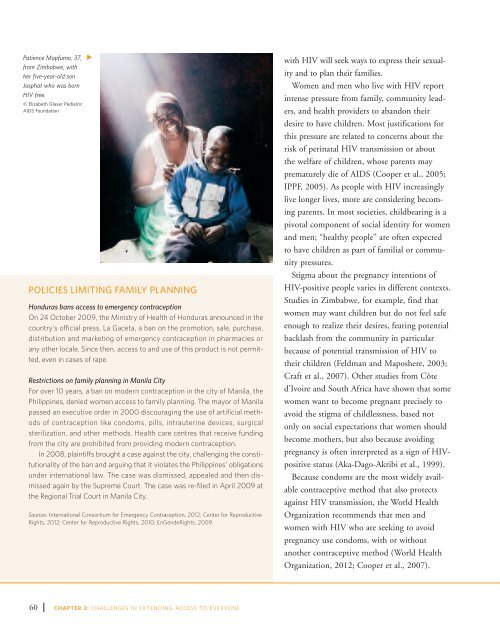State of World Population 2012 - Country Page List - UNFPA
State of World Population 2012 - Country Page List - UNFPA
State of World Population 2012 - Country Page List - UNFPA
You also want an ePaper? Increase the reach of your titles
YUMPU automatically turns print PDFs into web optimized ePapers that Google loves.
Patience Mapfumo, 37,<br />
from Zimbabwe, with<br />
her five-year-old son<br />
Josphat who was born<br />
HIV free.<br />
© Elizabeth Glaser Pediatric<br />
AIDS Foundation<br />
t<br />
policies Limiting family planning<br />
Honduras bans access to emergency contraception<br />
On 24 October 2009, the Ministry <strong>of</strong> Health <strong>of</strong> Honduras announced in the<br />
country's <strong>of</strong>ficial press, La Gaceta, a ban on the promotion, sale, purchase,<br />
distribution and marketing <strong>of</strong> emergency contraception in pharmacies or<br />
any other locale. Since then, access to and use <strong>of</strong> this product is not permitted,<br />
even in cases <strong>of</strong> rape.<br />
Restrictions on family planning in Manila City<br />
For over 10 years, a ban on modern contraception in the city <strong>of</strong> Manila, the<br />
Philippines, denied women access to family planning. The mayor <strong>of</strong> Manila<br />
passed an executive order in 2000 discouraging the use <strong>of</strong> artificial methods<br />
<strong>of</strong> contraception like condoms, pills, intrauterine devices, surgical<br />
sterilization, and other methods. Health care centres that receive funding<br />
from the city are prohibited from providing modern contraception.<br />
In 2008, plaintiffs brought a case against the city, challenging the constitutionality<br />
<strong>of</strong> the ban and arguing that it violates the Philippines’ obligations<br />
under international law. The case was dismissed, appealed and then dismissed<br />
again by the Supreme Court. The case was re-filed in April 2009 at<br />
the Regional Trial Court in Manila City.<br />
Sources: International Consortium for Emergency Contraception, <strong>2012</strong>; Center for Reproductive<br />
Rights, <strong>2012</strong>; Center for Reproductive Rights, 2010; EnGendeRights, 2009.<br />
with HIV will seek ways to express their sexuality<br />
and to plan their families.<br />
Women and men who live with HIV report<br />
intense pressure from family, community leaders,<br />
and health providers to abandon their<br />
desire to have children. Most justifications for<br />
this pressure are related to concerns about the<br />
risk <strong>of</strong> perinatal HIV transmission or about<br />
the welfare <strong>of</strong> children, whose parents may<br />
prematurely die <strong>of</strong> AIDS (Cooper et al., 2005;<br />
IPPF, 2005). As people with HIV increasingly<br />
live longer lives, more are considering becoming<br />
parents. In most societies, childbearing is a<br />
pivotal component <strong>of</strong> social identity for women<br />
and men; “healthy people” are <strong>of</strong>ten expected<br />
to have children as part <strong>of</strong> familial or community<br />
pressures.<br />
Stigma about the pregnancy intentions <strong>of</strong><br />
HIV-positive people varies in different contexts.<br />
Studies in Zimbabwe, for example, find that<br />
women may want children but do not feel safe<br />
enough to realize their desires, fearing potential<br />
backlash from the community in particular<br />
because <strong>of</strong> potential transmission <strong>of</strong> HIV to<br />
their children (Feldman and Maposhere, 2003;<br />
Craft et al., 2007). Other studies from Côte<br />
d’Ivoire and South Africa have shown that some<br />
women want to become pregnant precisely to<br />
avoid the stigma <strong>of</strong> childlessness, based not<br />
only on social expectations that women should<br />
become mothers, but also because avoiding<br />
pregnancy is <strong>of</strong>ten interpreted as a sign <strong>of</strong> HIVpositive<br />
status (Aka-Dago-Akribi et al., 1999).<br />
Because condoms are the most widely available<br />
contraceptive method that also protects<br />
against HIV transmission, the <strong>World</strong> Health<br />
Organization recommends that men and<br />
women with HIV who are seeking to avoid<br />
pregnancy use condoms, with or without<br />
another contraceptive method (<strong>World</strong> Health<br />
Organization, <strong>2012</strong>; Cooper et al., 2007).<br />
60 CHAPTER 3: CHALLENGES IN EXTENDING ACCESS TO EVERYONE
















